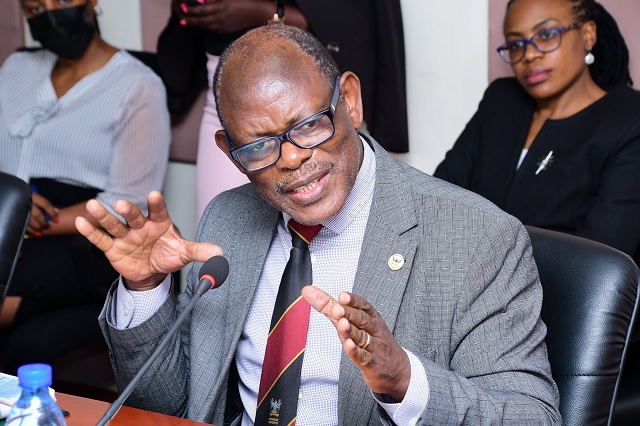Prof Nawangwe said that the Makerere University’s biometric access system is an administrative arrangement but NOT a welfare issue.

Tension is mounting at Makerere University as staff associations challenge the implementation of the Biometric Access System on campus, defying directives from the Vice-Chancellor, Professor Barnabas Nawangwe.
Staff, through their associations – Makerere University Academic Association-MUASA, Makerere University Administrative Staff Association-MASA, and National Union of Education Institutions-NUEI, expressed their objections in a written response to Professor Barnabas Nawangwe when his memo on the development leaked at the end of the month of October 2023.
Earlier, URN reported that MUASA had resolved to reject the adoption of the Biometric Attendance Management System on the grounds that there are more effective methods to monitor academic staff performance and productivity. One of the primary grievances voiced by the staff is the perceived lack of adequate consultation and stakeholder engagement before initiating the Biometric system. They argue that this move could seriously undermine their ability to fulfil the University’s mission.
In his communication, Prof Nawangwe stated that there are symptoms of indiscipline among some staff at Makerere, manifested through a lack of respect for official schedules and the creation of individual timetables with little regard for student convenience. He noted that some of the staff are reportedly teaching at other universities or working in other organizations, where discipline is strictly enforced.
“Failure by some colleagues to teach the full curriculum, one even reported to have set an examination for the whole syllabus after delivering only one lecture out of the expected fifteen, which the students rightly rejected,” he said.
Nawangwe explained that these malpractices are not unique to Makerere and exist in many universities worldwide. To address these issues, he argued that biometric access systems are a global norm in universities, and Makerere is one of the few major international universities that has not yet implemented such a system.
Nawangwe firmly stated that the Biometric Access System would be implemented as planned and warned MUASA against misleading members of staff into defiance.

“I must strongly warn MUASA against misleading staff into defiance on this matter. Members of staff are advised to abide by University regulations in order to avoid unnecessary inconveniences. The biometric access system is an administrative arrangement and NOT a welfare issue,” he warned.
However, the staff associations did not accept Nawangwe’s warning.
In their letter response signed by the three associations, the staff argued that universities globally employ electronic access systems, allowing staff to access offices and work at any time, unlike the proposed system of clocking in at 8:00 a.m. and clocking out at 5:00 p.m.
“If this is what you meant, then it’s a bad copy and paste,” reads part of the letter. The staff asserted that they need the flexibility to engage in research both in the office and in the field and community, which would be hindered by the requirement to be physically present from 8:00 a.m. to 5:00 p.m.
“How can staff conduct research while the University demands that they have to sit in the office from 8:00 am to 5: 00 am.?” the staff asked. Nawangwe had previously urged the staff to increase their publication rates and transform Makerere University into a research-led institution, where every academic should produce at least one publication annually. The staff raised concerns about the practicality of this expectation given the proposed biometric system.
The situation at Makerere University continues to be tense as staff associations stand their ground against the implementation of the Biometric Attendance Management System, advocating for alternative, more effective methods of monitoring academic staff performance.”
